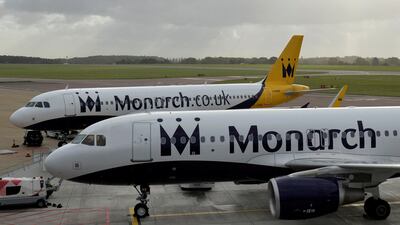British airline and travel firm Monarch was placed into administration on Monday, with terror attacks in Tunisia and Egypt, coupled with the weak pound being blamed for the collapse of the low-cost carrier.
The UK's fifth largest airline announced it was to cease trading at 4am BST, (7am GST) when all its planes had been grounded.
The announcement has left 110,000 passengers stranded overseas, who will be picked up by government body the Civil Aviation Authority.
Around 860,000 passengers were told on Monday morning that they had lost their bookings with the airline. Due to the last-minute announcement, many had already arrived at airports across the UK before they discovered they would not be able to fly.
Blair Nimmo from KPMG, the company appointed as administrators on Monday morning, said that falling revenues in an increasingly competitive market, combined with increased costs as a result of currency fluctuations, had created losses which made Monarch's future "unsustainable".
Speaking to The National, Mr Nimmo said the reason for the collapse was created “partly by a depressed revenue stream because of overcapacity in the short haul market, brought about by the terrorism activities in Tunisia and Turkey [AND] Sharm El Sheikh.”
"The cost space has [also] increased through the devaluation of the pound against the dollar," he added.
Monarch employs 2,100 people split between the tour group and the airline. It also employs a further 600-700 people as part of its engineering body, but this arm of the company is outside of the insolvency, Mr Nimmo said.
Britain’s transport secretary Chris Grayling said that the airline had been a victim of a “price war” in the Mediterranean in an interview with the BBC.
Mr Grayling, who had campaigned for Britain to leave the European Union before the 2016 referendum vote, denied that Brexit’s impact on the weakening of the pound had been a factor in the collapse.
He asked holiday makers abroad to be patient while the CAA carries out its "biggest peacetime repatriation" effort using 30 planes.
John Strickland, director at JLS consulting said Monarch had “lost its way” trying to compete with dominant low cost European airlines like Ryanair and EasyJet.
He said: “The market is very competitive especially as most airlines have shifted capacity out of the Eastern Mediterranean to markets such as Spain following terror attacks. This has led to overcapacity & price pressure.”
Monarch was bought in 2014 by London-based investors Greybull Capital, having previously been owned by the Swiss-Italian Mantegazza family since its launch in 1968.
Greybull put £165 million (Dh811m) into the company last year when the airline was on the edge of collapse, but this was not enough to save it.
Aviation analyst Jonathan Wober told The National that Monarch had been “burning cash” and flying on “close to empty” for a while.
“It was thought that its last cash injection from its owner might see it through for now, but it was always likely to keep coming back for more, and it seems that owner Greybull's pockets are empty,” Mr Wober added.
A spokesperson for British Prime Minister Theresa May said she felt “hugely sorry” for those affected by the collapse.

